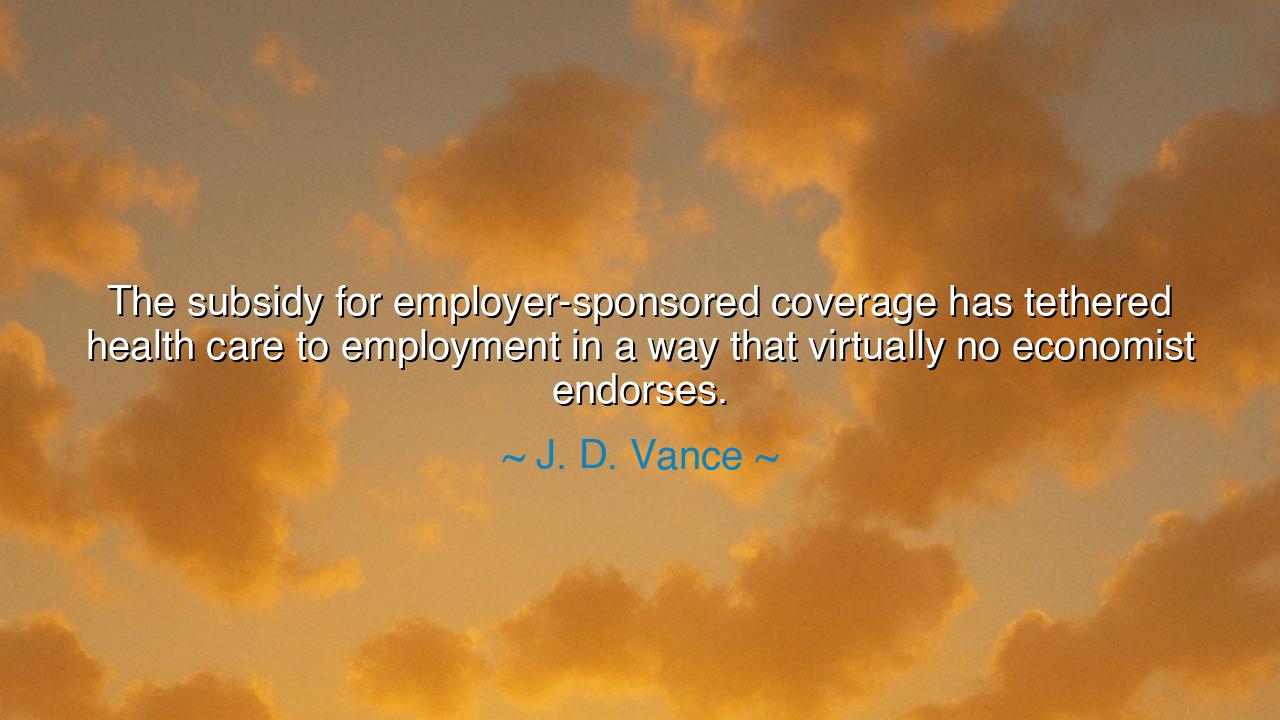
The subsidy for employer-sponsored coverage has tethered health
The subsidy for employer-sponsored coverage has tethered health care to employment in a way that virtually no economist endorses.






The words of J. D. Vance—“The subsidy for employer-sponsored coverage has tethered health care to employment in a way that virtually no economist endorses”—speak not only of economic design but of the deeper human struggle between freedom and dependency, between security and servitude. Beneath this statement lies a profound truth about modern civilization: when a society binds a person’s well-being to their labor, it risks turning care—a sacred right—into a privilege of productivity. Vance’s insight is not merely about policy; it is about the soul of a people who have forgotten that health, like air or sunlight, should never be contingent upon one’s occupation.
To understand the roots of his words, one must look to the postwar era, when nations sought stability after chaos. In America, employers began offering health insurance as a way to attract workers during a time of wage controls and economic rebuilding. What began as a gesture of practicality slowly hardened into a structure of dependency. Generations grew up believing that to lose one’s job was not only to lose income, but also the right to care, to healing, to dignity. Thus, the tether was forged—a chain made not of iron, but of bureaucracy and fear.
This system, Vance laments, is one that even economists reject, for they see that it traps both employers and workers in an unnatural bond. When health care depends on employment, the worker is no longer truly free. He stays in jobs he despises, endures bosses who mistreat him, or fears to start anew, all because his family’s health hangs in the balance. In this way, a noble idea—security through work—becomes a quiet tyranny. It is not the whip that drives him, but the silent terror of illness and the loss of coverage. The ancients would have called this a bondage of the spirit—a subtle enslavement disguised as stability.
Consider the story of John Adams, a craftsman from the early industrial age in England. When the textile mills rose and labor became centralized, he abandoned his family trade to work in a factory, lured by the promise of regular pay and employer benefits. But when the mill closed during an economic downturn, his family was left destitute—not because he lacked skill or strength, but because his livelihood and welfare had become entwined with a single master. His plight echoes across centuries into the modern age, where millions live as he did—dependent not upon their own hands, but upon a system that withholds care unless they serve.
The wisdom of the ancients teaches us that no blessing should come at the price of freedom. The philosopher Aristotle wrote that the good society is one where every citizen can pursue virtue without fear of destitution. Health, in this sense, is not a commodity but a foundation upon which virtue stands. Without it, a man cannot work, cannot dream, cannot live fully. Thus, to tether health care to employment is to invert the natural order—to make survival contingent upon service, rather than service the fruit of survival.
Vance’s lament, therefore, is a call to unbind this chain—to create a society where health care flows from citizenship, not servitude. He does not speak against work, but against the idea that worthiness for care is earned through labor. For even the weakest, the old, and the broken deserve healing. The ancients who built temples to Asclepius, the god of medicine, welcomed all who suffered, whether slave or free. They knew that to heal one person was to strengthen the whole community.
So, let these words be a lesson to our age: a nation cannot call itself free if its people must beg for care through employment. Let policy-makers remember that security without freedom is imprisonment, and labor without dignity is exploitation. Let every man and woman work not out of fear of losing health, but out of the joy of contributing to a world that values them beyond their productivity.
And you, listener of these words, take this truth to heart: strive for a world where compassion is not conditional, and where the right to health is recognized as the birthright of every soul. For only when care is unchained from commerce will we stand as a civilization both prosperous and humane—a people who serve not because they must, but because they are well enough to do so.






AAdministratorAdministrator
Welcome, honored guests. Please leave a comment, we will respond soon